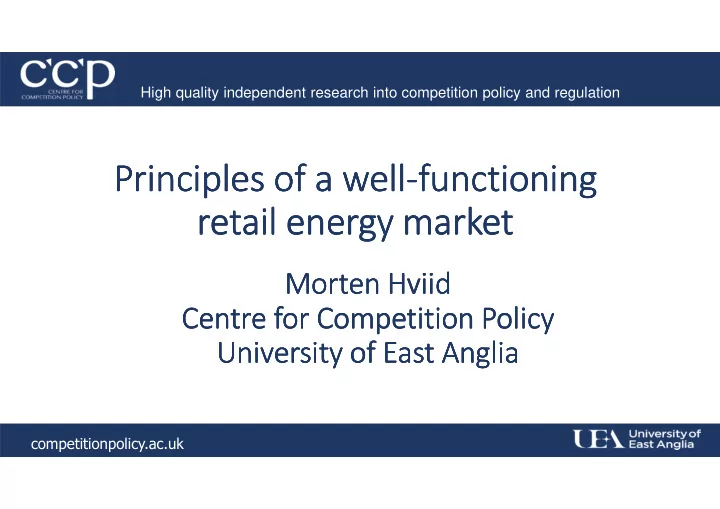

High quality independent research into competition policy and regulation Principles Principles Principles Principles of a well of a well of a well of a well- - - -functioning functioning functioning functioning retail energy retail energy market retail energy retail energy market market market Morten Hviid Morten Hviid Morten Hviid Morten Hviid Centre for Competition Policy Centre for Competition Policy Centre for Competition Policy Centre for Competition Policy University of East Anglia University of East Anglia University of East Anglia University of East Anglia competitionpolicy.ac.uk competitionpolicy.ac.uk
What makes a market well What makes a market well What makes a market well What makes a market well- - - -functioning? functioning? functioning? functioning? Simple economic answer � price is equal to marginal costs � [or average costs if natural monopoly and fixed costs are positive] � Incentives for productive efficiency � Incentives for optimal level of innovation We tend to see competition as the main driver for all – so important to have several (potential) competitors Non-economists may also think that a well-functioning market allocate benefits fairly. High quality independent research into competition policy and regulation
The fundamental challenge: product The fundamental challenge: product The fundamental challenge: product The fundamental challenge: product homogeneity homogeneity homogeneity homogeneity At the retail level, the primary product, be it gas or electricity, is a homogeneous good and it has to remain so � Under standard assumptions about consumer behaviour, this means that competition will be very intense � And, if there is any fixed costs which can be avoided by shutting down the firm, that the predicted market structure is M ONOPOLY High quality independent research into competition policy and regulation
Clash with reality Clash with reality Clash with reality Clash with reality Not necessarily � Look at UK until recently � Mergers reduced number of regional incumbents � Very little successful entry � “The curious incidence of the dog in the night- time” But areas where the fit is less good � What is the key product which is being sold? High quality independent research into competition policy and regulation
Ways out of the paradox Ways out of the paradox Ways out of the paradox Ways out of the paradox Product differentiation � Can be achieved with bundling, but significant differentiation would appear difficult [and costly] � Think about the advertising spend attempting to argue that petrol differ across brands Tacit collision [conscious parallelism] � Not obvious that this is actually stable if consumers are fully rational Consumer engagement � Large set of loyal consumers � Pay for the fixed costs – but who is paying � Can also support tacit collusion story High quality independent research into competition policy and regulation
If some consumers pay extra, then what If some consumers pay extra, then what If some consumers pay extra, then what If some consumers pay extra, then what about distributional effects? about distributional effects? about distributional effects? about distributional effects? Is it fair? � Depends on the identity of the loyal (inactive) consumers And what about “big data”? � Technically firms have the information to price discriminate further � This can be welfare enhancing but is it fair? � This can increase competition by allowing more profits to fund fixed costs � Can reduce entry depending on who owns the data � Policy questions: who owns consumer data? High quality independent research into competition policy and regulation
Conclusion: types of intervention with Conclusion: types of intervention with Conclusion: types of intervention with Conclusion: types of intervention with heterogeneous consumers heterogeneous consumers heterogeneous consumers heterogeneous consumers If the “problem” is consumer behaviour how and when can we justify intervention? � Thought experiment: for all consumers, look at their regular expenditure and estimate how much money they leave on the table by not making optimal choices. � For those who leave no money behind but who is by some measure not able to buy necessities, they are poor – policy focused at alleviating this � For those who leave money on the table and are not able to reach this money, they are vulnerable. What is the appropriate policy intervention? High quality independent research into competition policy and regulation
Recommend
More recommend